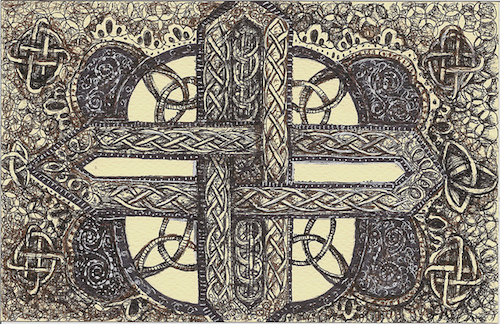We run our website the way we wished the whole internet worked: we provide high quality original content with no ads. We are funded solely by your direct support. Please consider supporting this project.

The Cross and The Trinity
Out of love for humankind, Scripture tells us, Jesus emptied himself of his divine prerogatives, set aside the glory he had with the Father from before the foundation of the world, became a human being and bore our sin as he died a God-forsaken death on Calvary (Phil 2:5-7). Though Jesus remained fully God, he entered into total solidarity with humanity by becoming a full human being. And though Jesus remained sinless, he entered into total solidarity with our sin and condemnation, to the point that Paul boldly proclaimed that Christ in some sense became our sin and became our curse (2 Cor 5:21). The cross is the culminating expression of the meaning of the Incarnation and everything else Jesus was about.
The cross reveals a God of unfathomable humility and mercy who is not above stooping to appear far less beautiful than he actually is—to appear as a guilty, crucified criminal!—in order to save us and to continue to achieve his sovereign purposes. The essence or character of God is the incomprehensibly humble, self-sacrificial love displayed on the cross.
While this revelation of course never ceases to be wonderfully mysterious, I believe it can be rendered intelligible, but only when we accept that God’s eternal nature is a union of three divine Persons who eternally give themselves wholly to one another in perfect, humble, self-giving love.
As Father, Son and Holy Spirit, God is from all eternity a self-giving God who pours himself out for “another.” Indeed, this is not only something the three Persons of the Trinity do; this is who the triune God eternally is. As TF Torrance writes,
The atoning act perfected in the cross of Jesus Christ is grounded in the very being of the eternal God, that is, in the eternal being of the Holy Trinity (The Mediation of Christ, 113).
This, I contend, is the meaning of the revelation that God is love—the kind of love that is revealed when God stoops to the infinite extreme of becoming a human and dying on a cross for a race of people who could not deserve it less (I Jn 4:8; 3:16).
The revelation of the Trinity renders the revelation of God on the cross intelligible because it means that when God humbly poured himself out on behalf of humanity by stooping to the furthest extreme possible, he was not doing something foreign to himself. To the contrary, by stooping in this way, the eternal triune God was simply enveloping humans into the self-giving, triune love that he eternally is.
As paradoxical as it sounds, when God the Son stooped to the infinite extremity of taking on our God-forsakenness on the cross, he was manifesting outwardly, in time, the perfect unity he eternally enjoys with the Father and the Spirit. Because God’s true eternal nature is a perfect, other-oriented, self-giving fellowship of three divine persons, we can begin to understand the paradoxical claim that God is revealed by becoming something that is not only different from himself (a human being), but that is even utterly antithetical to himself (our sin and God-forsakenness). The infinite intensity of the perfect love that is the eternal character of the triune God is most clearly revealed in the fact that God condescended to the furthest extreme possible out of love for a race of rebels who wanted only to crucify him.
Photo credit: molossus, who says Life Imitates Doodles via Visual Hunt / CC BY-NC-ND
Category: General
Tags: Cross, Cruciform Theology, Trinity
Topics: Attributes and Character
Related Reading

Podcast: Has Greg ‘Gone Liberal’ in His Cruciform Hermeneutic?
Greg consoles a disappointed fan and discusses Cruciform Hermeneutics. http://traffic.libsyn.com/askgregboyd/Episode_0365.mp3

Re-Thinking Divine Sovereignty
Many people in the church have been taught that divine sovereignty is synonymous with unilateral control. Some have even argued that if God is not in control of everything, then something must be in control of him. Still others have proposed that if God is not sovereign over all, then he has no sovereignty at…

Who Killed Ananias and Sapphira? A Response to Paul Copan (#6)
In his critique of Crucifixion of the Warrior God (CWG), Paul Copan makes a concerted effort to argue that the God revealed in Jesus Christ and witnessed to throughout the NT is not altogether non-violent. One of the passages Copan cites against me is the famous account of Ananias and Sapphira falling down dead immediately…

Final Thoughts on Copan’s Critique of Crucifixion of the Warrior God
I want to sincerely thank Paul Copan for his well-researched critique of Crucifixion of the Warrior God (CWG) that I’ve been responding to over the last several weeks. He exposed areas in my work that needed buttressing up and/or clarifying, and he has helped introduce my ideas into the theological and philosophical marketplace of concepts…

Atonement: What is the Christus Victor View?
Most western Christians today understand the atonement as a sort of legal-transaction that took place between the Father and the Son that got humanity “off the hook.” The legal-transaction scenario goes something like this: God’s holiness demands that all sin be punished, which in turn requires that sinners go to eternal hell. The trouble is,…

Are You Fully Alive? Here’s the Key
Image by rashdada via flickr. The cross reveals the full truth about us. This truth reconnects us with our true source of life, which in turn heals our idol addictions. This dimension of the cross is frankly so breathtakingly beautiful that, so far as I can tell, very few followers of Jesus have ever really grasped it.…
